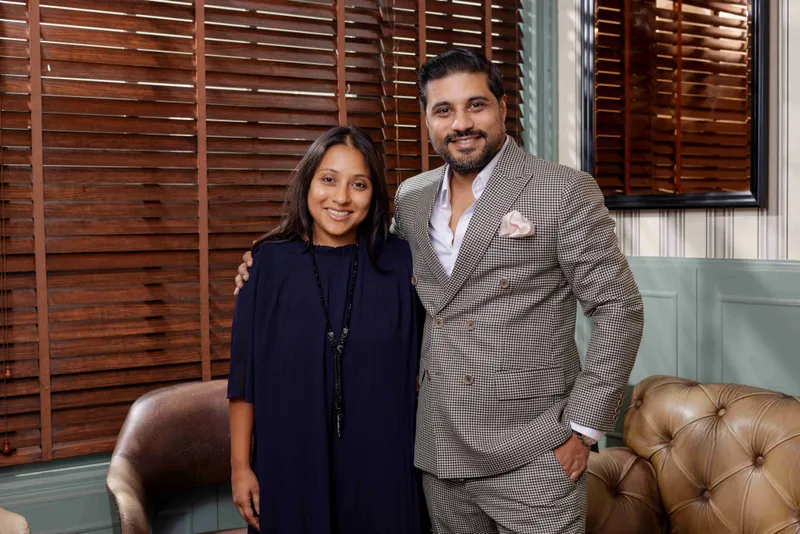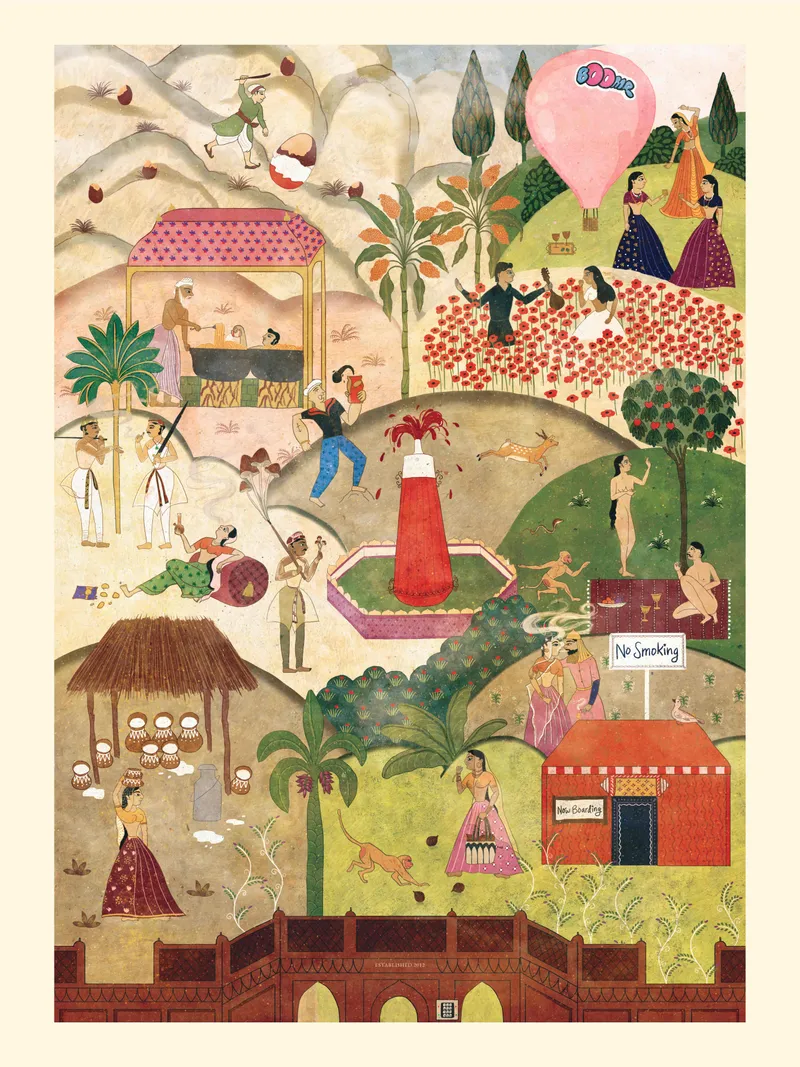Embracing the 'Forbidden': India's first speakeasy's revamp includes chyawanprash, hash oil in cocktails
PCO's new menu, The Forbidden, features 12 concoctions—each consisting of an ingredient considered forbidden in certain parts of the world or under certain circumstances.
It was just 6 PM when my cab stopped at the D-Block Market in Vasant Vihar, a residential locality in New Delhi. My phone told me, ‘You have reached your destination,' but I was in the middle of a dark, narrow lane.
There's no neon sign or a vintage board signalling my destination—nor any indication of the exciting evening I had in mind. But that’s the point of speakeasy bars—you are only meant to find the way if you’re familiar with it.
In an almost filmy fashion, I'm guided to an unassuming phone booth, where I punch in a four-digit code in the wall phone’s dial, followed by a hashtag to finally enter India’s first speakeasy bar, named very aptly, PCO—short for Pass Code India.
I am also told that the code is changed every week, and the door to the bar is accessible only for five seconds after the code has been punched in. “The code is shared each week with our curated list of patrons through broadcast groups on WhatsApp, consisting of a few thousand members,” Rakshay Dhariwal, Founder and Managing Director of PCO parent company, Pass Code Hospitality, tells YS Life.
The term ‘speakeasy’ became popular in the 1920s, during the infamous Prohibition, which illegalised the manufacture, transportation, and sale of alcohol in the US. Speakeasy was used to refer to secret bars, where alcohol was served illegally.
Today, ‘speakeasy’ is applied to legal bars—fashioned after the historical illegal watering holes—but are still hard to locate. The concept, still in its nascent stages in India, was introduced by sibling duo Radhika and Rakshay in 2012.

Siblings Radhika and Rakshay Dhariwal, founders of PCO
After having won multiple awards and critical acclaim—ranked in the top 10 bars in India in 30 Best Bars in India, titled as the ‘best cocktails in the capital’ by The Wall Street Journal, and the Times Food and Nightlife Best Bar in New Delhi award for six consecutive years—the Dhariwal siblings decided to revamp the whole experience.
Incidentally, PCO’s first major revamp coincided with the launch of its new cocktail menu, The Forbidden, which features 12 concoctions—each consisting of an ingredient considered forbidden in certain parts of the world or under certain circumstances.
“We have embraced the mystery and allure of the speakeasy culture. We are incorporating unconventional, misunderstood, and even prohibited ingredients in each drink,” Rakshay says.
Mystery at its core
As I walked into the hidden space, a tiny, almost unnoticeable hallway led to the ice room—a new addition to PCO—and the Indian bar space—to elevate the cocktail experience.
Next to it, I spot two staircases—one leading to the upper floor and the other to the basement. Radhika suggested we head up first. The stairs, narrow enough to allow just two people to pass at a time, are lined with unusual paintings and photographs—of things and people that can be termed as rebellious.

The team behind the bar at PCO Delhi
Bengali cuisine for the global palate: Sienna Café’s pop-ups win heart and soul
“All the artwork are interpretations of different things and represent little moments considered taboo,” she adds. This was a prelude to what awaited at the bar—already setting the mystery tone.
Redesigned by Delhi-based architect Anica Kochhar, the Dhariwal siblings majorly focused on structural changes—enhancing the bar countertop, cigar room, and wash areas, and refurbishing the ‘Director’s Room’—for PCO 2.0.
“Our design brief was to amplify the nostalgic and vintage essence of our speakeasy, incorporating elements like wooden panelling, brass lighting, and rich burgundy and olive hues throughout the space,” Rakshay says.
On the first floor lies a small bar beside the two rooms that add to PCO’s personality—the cigar room and the Director’s Room. Although always a part of the PCO experience, the rooms have been renovated with newer furniture and fresh wallpapers to keep up with the look and feel of the new theme.
Earlier offering signature ‘mood cocktails’—tailored to the different moods of guests—the exclusive 12-seater Director’s Room has been reimagined in an Omakase-style concept—a popular Japanese culture, where diners are left at the chef’s discretion.

At its centre, the menu has an illustration designed by graphic artist Rushil Bhatnagar, inspired by Indian miniature paintings. The forbidden ingredients from each of the 12 concoctions are tucked in the painting
The reservation-only Director’s Room, which feels like a bar within a bar, has expert mixologists craft cocktails tailored to the mood of its guests based on three simple questions—how are they feeling, what’s their choice of spirit, and flavour profile.
The room invites patrons to be the ‘directors’ of their own cocktail journey for the night.
Downstairs, in the basement, lies the dull-lit and dingy bar, where the main action takes place. Post the renovation, the bar counter has been extended to nearly double its previous size, providing a larger workspace for the mixologists, and now featuring draft machines.
Originally located on the side of the bar counter, the revamped space has the smoking room relocated to the wine cellar at the opposite end.
Forbidden menu
The forbidden menu is made into a canvas scroll, presented inside a leather case. At its centre is an illustration designed by graphic artist Rushil Bhatnagar, inspired by Indian miniature paintings. The forbidden ingredients from each of the 12 concoctions are tucked in the painting.
The menu features 10 signature cocktails—priced between Rs 750 and Rs 900—and two zero ABV drinks, priced at Rs 500, for non-drinkers. Each forbidden ingredient, used in the optimal form, is balanced with the profile of the base spirit.
The menu begins with Eve’s Choice. “When brainstorming a list of ingredients, the idea of the forbidden fruit was one of the first to come to mind. Drawing inspiration from the Garden of Eden—where the apple was forbidden and ultimately tempted Eve…,” Rakshay says. The fruity tequila cocktail combines agar-washed apple juice with tequila, fresh jalapeno, fennel distillate, clear lime juice, and hazelnut.

Oral Fixation has Dewar’s 12 paired with almond, amaro, coffee, demerara, sugar, gentian root, and the forbidden ingredient--tobacco paan distillate
Ignorance Is Bliss, a bourbon cocktail, features chyawanprash as its key ingredient. The ayurvedic remedy that India swears by, has been banned in certain countries for the amount of lead content in it.
Pass The Dutchie features white wine and vodka with jasmine liqueur, orange marmalade, malic acid, and hash oil—made from the resin of cannabis.
Similarly, Opium Den consists of gin, raspberry tea, vetiver distillate, pine distillate, black currant, lime, saline, and poppy seed, which is banned in certain countries, owing to its distant relationship to opium.
A crowd favourite, Oral Fixation, has Dewar’s 12, almond, amaro, coffee, demerara, sugar, gentian root, and tobacco paan distillate—tobacco being heavily regulated in many countries.
Other forbidden ingredients that made it to the menu include ketchup, Porcini hydrosol, egg chocolates, bubble gum, and MSG—each considered forbidden in some way or the other.
“The new identity reflects our commitment to innovation in the evolving landscape of cocktail culture. PCO 2.0 offers our patrons more than just a drink, but a fun experience that challenges norms and excites the palate,” Radhika says.
So, what’s your choice of poison?
Edited by Suman Singh







